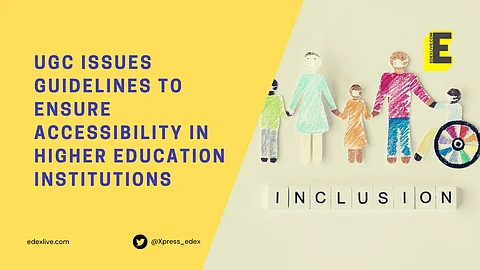

The University Grants Commission (UGC) issued a list of guidelines and standards to ensure accessible education for disabled students in Higher Education Institutions (HEI). The recommendations were listed by an expert committee that was constituted by the UGC Chairman, M Jagadesh Kumar and the final document is called Accessibility Guidelines and Standards for Higher Education Institutions and Universities.
The guidelines have specified a Need Assessment Process to be undertaken by HEIs in order to assess the requirements of Persons With Disabilities (PwD) who join their campus, and provide appropriate support. The process involves the student submitting an application to the institution, which will then have it assessed by an internal committee. The committee will then consult with the District Disability Rehabilitation Centre (DDRC) to provide reasonable accommodation to the students with disabilities. The guidelines have suggested the creation of a Need Assessment Board for this purpose.
Pointing out that the absence of mobility options for PwDs can impede their chances of getting a higher education, and also keep PWD staff from working at HEIs, the expert committee has suggested that institutions collaborate with the public or state transport agencies in order to arrange for convenient modes of transit for PwDs to and from the institution. It has also instructed universities to ensure disability-friendly shuttles with wheelchair accessibility operate within the campus in order to ensure last-mile connectivity for students and teachers with disability.
Support with curriculum and assessment
Apart from providing support for accessibility on campus, the guidelines also make provisions for formulating an "accessible and inclusive curriculum." Suggestions have been made for offering multiple means of instruction for the curriculum and flexibility in the course load, schedules attendance requirements, and assessment of the programmes.
In terms of accessibility of course content, the committee has recommended that all content uploaded on the internet should adhere to the e-content accessibility guidelines issued by the Department of Education. It has pointed out examples such as scanned documents not being compatible with screen-reading software, and the need to ensure documents comply with Unicode standards to ensure they can be accessed by Assistive Technologies. Universities and colleges have been asked to conduct awareness seminars and workshops on updated Assistive Technologies, and to create resource centres for the same.
Social and emotional inclusivity
The document also has provisions to promote Social Emotional Learning (SEL) on campus. "The development of a safe social and emotional learning climate is a must and also considered as a prerequisite for SEL through positive acceptance and interactions by peers and teachers. Students must feel that they have somebody to speak to when they are worried or upset," says the report. It also highlights the need for inclusion in campus life for all students, including PwDs. It has encouraged HEIs to work towards removing the stigma faced by PwDs, and ensuring they are able to participate in campus activities.
In order to ensure that these provisions are implemented, the committee has said that inclusivity and accessibility must become important parameters in the ranking and accreditation process. Apart from this, the universities themselves must formulate an expert or advisory committee for the same, and carry out the self-certification process for accessibility under the Rights of Persons With Disabilities Act (2016).
For transgender persons, acid attack survivors
The guidelines have also specified the nature of support that may be required for persons with various disabilities, and have included survivors of acid attacks and transgender persons in the list. The document states that the right to education without discrimination for transgender persons is a provision under the Transgender Persons (Protection of Rights) Act, 2019. Under the category of Disability Specific Needs, the document states that transgender persons may require "emotional-behaviour and psycho-social support", "support in campus records and documents", and "assistance in participation of activities or use of facilities."
